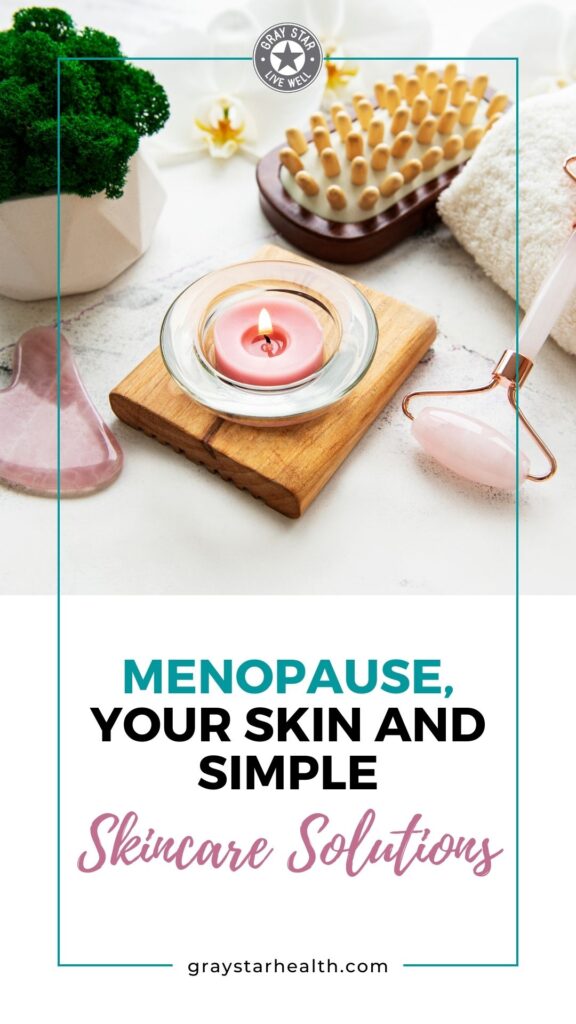The decline in estrogen levels during menopause plays a significant role in these transformations, impacting skin health in various ways. Understanding these changes and implementing simple strategies can help support your skin during this transition.

Estrogen Decline and Its Impact on Skin
Estrogen, a hormone primarily associated with reproductive functions, also plays a crucial role in maintaining skin health. As estrogen levels decrease throughout the menopause transition, several changes occur:
- Loss of Elasticity: Estrogen contributes to collagen production, which keeps the skin firm and elastic. Declining estrogen levels lead to decreased collagen production, resulting in the loss of skin elasticity and firmness.
- Dryness and Thinning: Estrogen helps regulate oil production and maintain skin moisture. Its decline can lead to dry, thinning skin, making it more prone to irritation and wrinkles.
- Increased Sensitivity: Estrogen influences skin thickness and the function of sensory nerves. Reduced estrogen levels can make the skin more sensitive, leading to heightened reactions to environmental factors and skincare products.
- Uneven Pigmentation: Estrogen plays a role in regulating melanin production, the pigment responsible for skin coloration. As estrogen declines, some women may experience changes in pigmentation, such as dark spots or uneven skin tone.
- Slower Wound Healing: Estrogen promotes wound healing by enhancing blood flow to the skin and supporting tissue repair mechanisms. Its reduction during menopause can lead to slower wound healing and increased susceptibility to skin injuries.

Simple Ways to Support Skin Health During Menopause
While the decline in estrogen during menopause is inevitable, there are simple strategies you can incorporate into your skincare routine to support your skin’s health and mitigate some of these effects. Keep in mind that what you put IN and ON your skin matters!

1- Hydration, hydration, hydration: Healthy skin requires hydration. At the very least, you should be drinking 1/2 your body weight in fluid ounces each day. To ensure that the water you drink is able to get into the cells properly, add electrolytes to at least 16-20 ounces once per day (LMNT is my favorite) or add a pinch of sea salt and a squeeze of lemon (or drops of pure lemon essential oil). Plain water is great, but it has to be able to get into the cells and electrolytes help make that happen!
2- Moisturize Regularly: Combat dryness and maintain skin hydration by moisturizing frequently with the right products. Look for products containing hyaluronic acid, peptides and ceramides, which help retain moisture and strengthen the skin barrier. I use peptide serums from the Ordinary link and apply them in layers for additional hydration and protection, then apply a topical moisturizer containing Estriol and finish with my favorite facial oils from doTERRA for the extra glow and fresh look!

3- Incorporate Antioxidants: Antioxidants such as vitamin C, vitamin E, Resveratrol and green tea extract can help protect the skin from oxidative stress and free radical damage. Incorporating antioxidant-rich serums or creams into your skincare routine to boost skin resilience and radiance. You can further support your skin by consuming antioxidant rich fruits and vegetables and consider adding supplements.
4- Vitamin A / Retinol: You’ve likely heard the recommendation for using a retinol product nightly. The skin needs Vitamin A promotes new cell turnover, speeds up healing, prevents breakouts and supports the skin’s immune system. Retinol is typically considered best against wrinkles and fine lines. However, it can cause drying, flaking and itchiness, so it’s important to start with a lower strength and layer in between moisturizers if needed.

5- Protect from UV Exposure: Sunlight is important for MANY reasons and I don’t believe in avoiding the sun. However, protecting your skin from UV rays helps prevent further skin damage, reduces the risk of age-related pigmentation and wrinkles. There is an important caveat….The sunscreen should have an SPF of 30 or higher AND it needs to be a non-toxic product. Sadly, most women are lathering toxic chemicals onto their skin and into their body with conventional sunscreens.
6- Healthy Lifestyle Habits: Maintain a balanced diet rich in fruits, vegetables, lean proteins, and omega-3 fatty acids to nourish your skin from within. Stay hydrated by drinking plenty of water and limit alcohol, sugar and processed foods which dehydrate and damage the skin’s resilience. You can be doing ALL the topical application, but what you are eating and drinking really matters when it comes to your skin health.
7- Consider Hormone Replacement Therapy (HRT): Talk to your healthcare provider about the potential benefits of hormone replacement therapy (HRT) to alleviate menopausal symptoms, including those affecting the skin. HRT can help replenish estrogen levels and mitigate some of the skin changes associated with menopause. Low dose topical estrogen (applied to face and neck) has been shown to increase collagen, improve elasticity and texture, and minimize fine lines – with no changes to serum hormones (doesn’t increase hormones in the body systemically).

Embrace Your Skin’s Evolution
As you navigate the journey of menopause, remember that the changes occurring in your skin are a natural part of this life stage. By understanding the effects of estrogen decline and adopting simple skincare practices, you can nurture your skin and maintain its health and vitality. Embrace this evolution with grace and confidence, knowing that self-care is key to feeling your best at every age.









